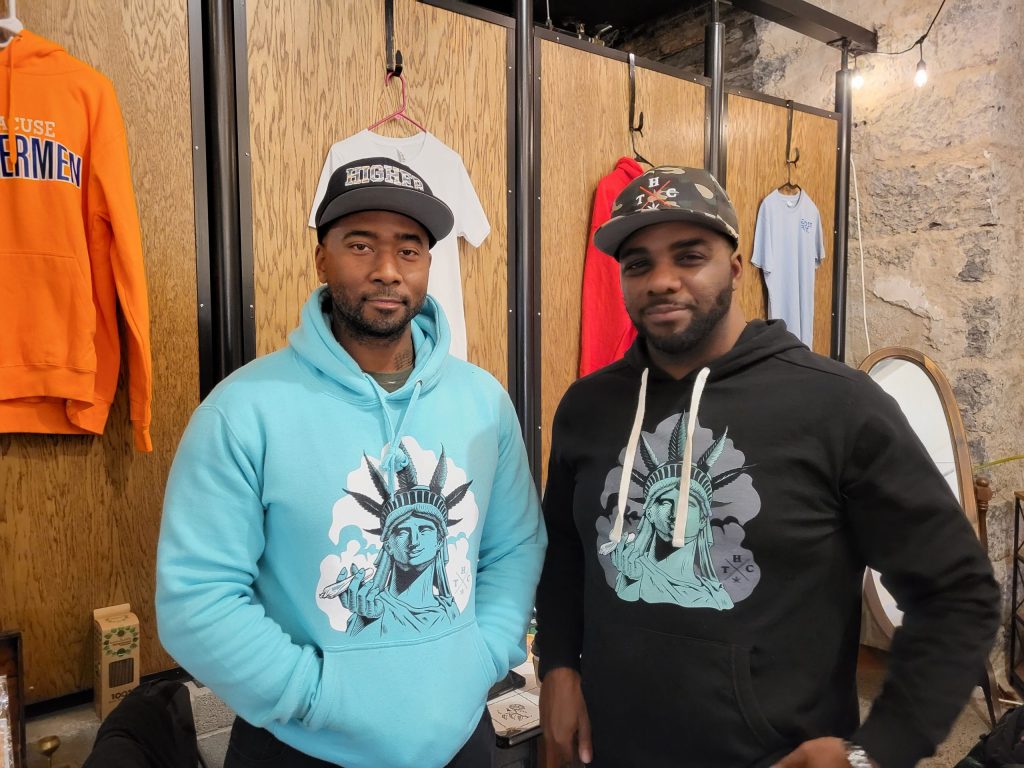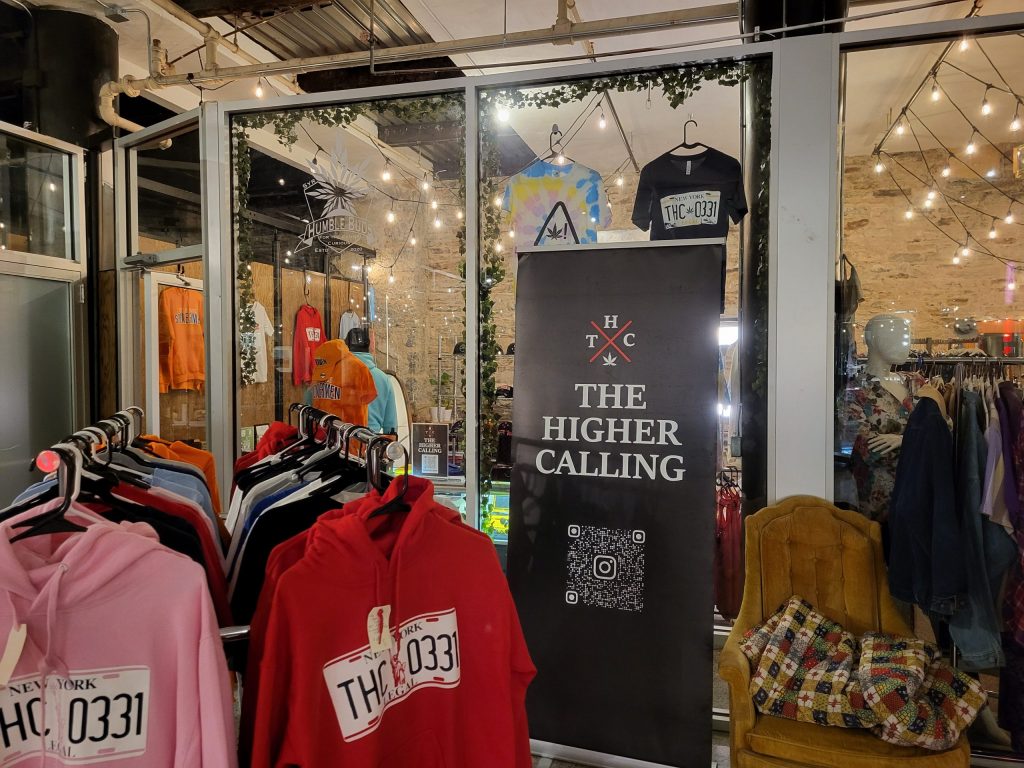Syracuse is growing its post-criminalized cannabis industry and killing stigmas
Syracuse is growing post-criminalized cannabis industry, killing stigmas

Almost two years after New York State legalized recreational cannabis, Mike Golden and Anthony Cage, owners of The Higher Calling, a Syracuse business that sells cannabis paraphernalia and clothing, found themselves attending seminars, community events, rallies and gatherings all dedicated to running a cannabis-based business.
They opened The Higher Calling to inform the Syracuse area of cannabis laws and to fight the stigma that using cannabis is shameful. Getting marijuana into stores and giving out marijuana retail licenses in New York is going at a slow pace; however, the state’s first cannabis-selling store did open its doors at the end of December.
Because of the hold-up and still waiting for their own license to sale, Golden and Cage are directing their attention to the thousands of people, including themselves, whose lives have been impacted by the criminalization of cannabis and how the state’s CAURD application is giving them a chance to erase the past.
“We helped really establish the legacy, you know, with the legacy market,” Golden said. “But, in the legal sense, this is a brand new industry. A billion-dollar industry is coming to the state, and what better time than being first to market or getting in from the ground up.”
After New York legalized recreational cannabis in 2021, the Office of Cannabis Management created Conditional Adult-Use Retail Dispensary Licenses (CAURD). The license would allow the first cannabis retail licenses in the state to go to people who were penalized by the criminalization of marijuana, such as those being charged with possession or having an immediate family member who has been.
Golden and Cage opened The Higher Calling and have applied for a CAURD license due to past charges of drug possession.
Their goal is to make a name for themselves while also lending a helping hand to others who wish to enter the industry. They want to change the narrative by showing that legacy cannabis sellers or victims of the War on Drugs now have the right to create businesses they once would be imprisoned for having.
For centuries, cannabis has either been prohibited or illegal in the U.S., and politicians have used the legislation around the drug to target communities and discredit them. In 1994, Richard Nixon’s domestic policy advisor John Ehrlichman admitted in an interview that the War on Drugs began as an attack on two enemies: The antiwar left and Black people.
“We knew we couldn’t make it illegal to be either against the war or Black, but by getting the public to associate the hippies with marijuana and Blacks with heroin, and then criminalizing both heavily, we could disrupt those communities,” Ehrlichman said in the interview. “We could arrest their leaders, raid their homes, break up their meetings, and vilify them night after night on the evening news.”
The term marijuana has its roots in racism. It replaced the original term, cannabis, in 1910 during the Mexican Revolution as a way for the American government to vilify Mexican migrants who happened to use the plant. The targeting of minority communities continued into the 1990s with the War on Drugs, which led to high rates of incarceration for Blacks and Latinos.

But now, New York State is rewriting history by prioritizing those affected by the criminalization of cannabis as it decided to legalize it.
In 2017, in a data brief from the John Jay College of Criminal Justice, researchers found that for every white person arrested for marijuana possession, 12.1 Black people were arrested in Upstate New York and 11.2 Black people were arrested in the rest of the state.
When New York moved to legalize cannabis in 2021, anyone charged for having three ounces or a maximum of 24 grams of concentrated cannabis in the past had the crime wiped from their record.
Dessa Bergen-Cicco, a public health professor and Coordinator of Addiction Studies Programs at Syracuse University, said it’s been an articulated part of officials’ plans to enact laws targeting drugs and the people who use them for years.
“So, it’s illegal all that time, but people are still doing it,” Bergen-Cicco said. “And if you look at even things broken down by race, there’s much higher sheer numbers of, for example, white people smoking or not smoking, using cannabis, but the percentage of people who are arrested, incarcerated, etc. is disproportionately Black.”
Bergen-Cicco believes this is why many states are finally choosing to make cannabis use legal: people still have access to it no matter the laws. However, New York took a step other states haven’t by helping those who’ve been victims of the laws.
“It was a recognition of the need to split the approach to drug policy from how we look at hard and soft drugs. All drugs are not the same,” Bergen-Cicco said. “So the social harms that were caused by cannabis being illegal far outweigh the physical harms that people experience from it.”
While Cage and Golden have submitted a CAURD application, they have yet to be informed if they will receive a license due to a court injunction preventing applicants in the Finger Lakes, Central New York, Western New York, Mid-Hudson and Brooklyn from getting a license.
“It leaves you kind of just, yeah, completely in limbo and not knowing,” Golden said.
Applying for the application was a challenging task. Golden said trying to obtain the paperwork to prove his crimes from several locations years after he was first charged became an issue.
“If you have multiple arrests, you want to get all the certificates, and you have to go to that municipality to get them,” Golden said. “But depending on when it was, they might have outdated computer systems at some of them, and things get lost.”
Some cities have designated employees who can help in starting a cannabis business. Cole King, a City of Syracuse Business Opportunity Specialist, is the point of contact for cannabis-related business inquiries in Syracuse. King approves of New York’s focus on individuals with drug charges or with marijuana affiliations, but he thinks requiring applicants to own a business for two years to qualify for the CAURD license has downsides.
“It is a good thought, but there still are negative connotations around it,” King said. “There’s going to be barriers.”
Supporting the community outreach Golden and Cage have done, King said more education needs to happen. He is currently attempting to form a partnership between the city and Syracuse University’s Cannabis Studies program.
“I think it would be good if SU would get on that train as well, and somehow we figure out how to make those classes available to people within the city of Syracuse, and not just students, at a reduced cost and figure out how to maybe offset those costs with funding from the city,” King said. “Just figuring out ways to make sure that that knowledge is able to be utilized by anybody that wants it.”
While The Higher Calling’s goal is to one day open a cannabis-infused food-selling business that plays live music, waiting for their license has let them cater to their community by changing how Syracuse views cannabis.
“I think people will ask more questions as they see more,” Cage said. “It’s kind of like, you got to see it to believe that kind of thing right now.”
Last October, the pair hosted a “Stop the Stigma” rally. They handed out cannabis joints for free and smoked with Syracuse citizens, and at 4:20 p.m., everyone in attendance smoked together. That’s what the owners love about cannabis: Golden said it brings people together. While smoking is still seen as problematic by many, the pair see it as an opportunity to grow in a new industry.
“I felt like the stigma was something, too, that was hindering people from taking the industry seriously,” Golden said. “It was kind of just like, you know, ‘Weed is legal; we can smoke hehe, haha.’”
Of the 21 CAURD applicants in CNY, only seven will get licenses. Golden and Cage believe they have a good shot of securing the license because the office that administers them previously reached out to the owners about their application.
With CAURD being the first retail license, the license holders are a hot commodity for growers and cultivators who can only sell their flower, the bud of the marijuana plant containing all of its cannabinoids, to CAURD receivers.
“Making the connections with the supply chain, even the cultivators, they’re saying the same thing—how do we get connected to these people because they’re the only ones that can buy our product,'” said Jim Charon, the Central New York Regional Committee chair for the Cannabis Association of New York.
As they wait for the injunction to end and to hear if they received a license, Cage and Golden are still selling clothes, raising awareness, making connections with cultivators and others in the industry, and taking advantage of the state’s new cannabis industry.
“I think it’s just the beginning,” Golden said.





